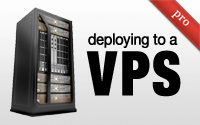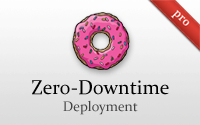Types
- Free Episodes
- Pro Episodes
- Revised Episodes
Categories
- Active Record
- Active Resource
- Active Support
- Administration
- Ajax
- APIs
- Authentication
- Authorization
- Background Jobs
- Caching
- Code Walkthrough
- Controllers
- Debugging
- Deployment
- eCommerce
- Forms
- Mailing
- Models
- Performance
- Plugins
- Production
- Rack
- Rails 2.0
- Rails 2.1
- Rails 2.2
- Rails 2.3
- Rails 3.0
- Rails 3.1
- Rails 3.2
- Rails 4.0
- Refactoring
- Routing
- Search
- Security
- Testing
- Tools
- Views
Capistrano Recipes
Get the most out of Capistrano by writing specific recipes with ERB templates. Here I show how to deploy to a blank VPS by running just a few Capistrano commands.
(13 minutes)
Deploying to a VPS
Deploying a Rails application can be overwhelming because there are so many different options. Here I present a pattern for deploying a Rails app to a VPS using nginx, Unicorn, PostgreSQL, rbenv and more.
(18 minutes)
Trinidad
Trinidad is designed to serve JRuby web applications and gives you the power of Java while still keeping the feel of traditional Rails deployment. Here I show how to setup a Capistrano recipe, configure it, and more.
(15 minutes)
Zero-Downtime Deployment
Here I show how to accomplish zero-downtime deployment using Unicorn. I also cover gotchas when working with migrations and how to put up a maintenance page when you do need to take down the site.
(12 minutes)
Monit
Monit can help ensure your Rails app stays up and running smoothly. Here I show how to set it up, receive alerts, and keep tabs on it through a web interface.
(16 minutes)
Chef Solo Basics
Chef is a provisioning tool which allows you to spin up production servers automatically. Here I show how to get started with Chef Solo and create a custom cookbook.
(17 minutes)
Asset Pipeline in Production
The Asset Pipeline is very useful, but it can be a pain in production. Here I show why it works the way it does, and how to customize it to fit your deployment setup.
(13 minutes)







